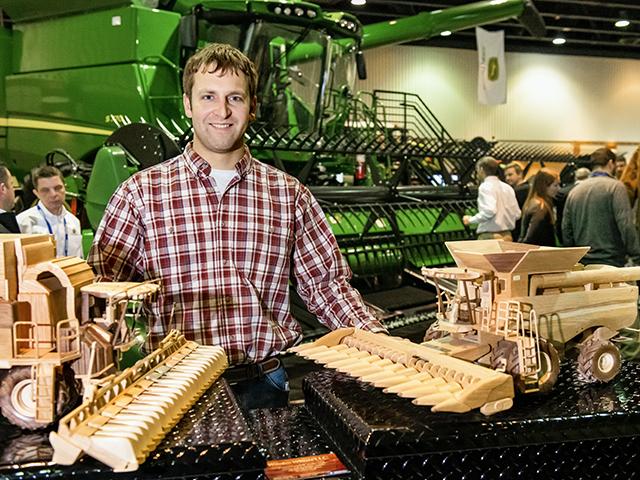Woodworked Replicas
Wooden Wonders
The tires come first, because no matter how detailed Aaron Zenner gets as he builds on to the rest of the project, it's the tires that usually take the most time.
He calls his company Wooden Wheels LLC, and with one glance at a tire, it's evident why it's such a focus.
Zenner builds wooden models of machinery, and he never shirks from the detail. His tires that grace, say, a John Deere combine don't stop at being round. There are dozens of treads carefully laid into each tire, settled into grooves carved just so.
They don't stop at treads, either. The duals his combine may be sporting have deep wheel wells and, at the center of them, 12 tiny lug nuts.
"Each tread is an individual piece," he says. "I build them all myself. It's a lot of work just to make them, but it's worth it in the end."
From there, Zenner says, "I start with the mainframe and build out."
That's how he builds his wooden wonders, but it's an equally fair description of how he built an unlikely career out of a hobby.
Zenner is from Raymond, Minnesota, a one-gas-station town a little more than halfway to South Dakota from Minneapolis. After growing up on a small family dairy operation, he long worked as a hired hand on local farms, often helping custom silage cutting crews.
That started to change about six years ago, when he initially built for himself a pair of model wooden trucks to relieve boredom.
P[L1] D[0x0] M[300x250] OOP[F] ADUNIT[] T[]
A friend saw those and asked if Zenner could build another. More friends saw that example, and slowly, building models became a way to pay the bills.
Three years in, he had so many requests stacked up, he had to start a waiting list, which quickly grew. Now, he's more of a model builder than he is a farmhand.
"Until the end of last year, I was fully employed on the farm; but this year, I'm going to be there about a month and a half or so," he says.
And, he'd like to keep it that way, never completely losing touch with the farm. But, at the same time, business is booming. Models he had on display at the 2022 U.S. Custom Harvesters convention in January in Amarillo, Texas, sold for more than $2,000. At that point, he had 63 orders on his list for the year and has already had customers from across the U.S. and even a few in Europe.
PIECE BY PIECE
Zenner's creations come together from hundreds of smaller pieces of wood, carefully crafted and then slotted and glued together to make a huge variety of equipment. He does most of the work with a table saw and a scroll saw, then uses a lathe, drill press and CNC (computer numerical control) machine at times.
He's built everything from Peterbilt semis, complete with stock trailers to Case IH QuadTrac tractors gleaming in a polished red wood. There are forage harvesters and fuel trucks, new tractors and antiques. The shovel arm bends on the excavator, and on the combine, the grain auger pivots, and the header even detaches.
Most of the machinery is modeled at 1/16 the scale, fitting roughly in a 2- x 2-foot box, though older, smaller tractors get bumped up to 1/12 the scale. Prices start around $250 for a small trailer or truck, and top out at more than $2,500 for larger machines.
He'll at least try to build any piece of machinery for which a customer can provide a picture.
"People usually want the kind of machine they have, so I try to copy what they have the best I can," Zenner explains. "I don't use many stains, but I do try to use red, yellow, purple or orange wood to match their real truck or combine, or whatever it is."
He leans on oak, maple and walnut, but will also use others to achieve a certain look. Red, for instance, is Chakte Kok, out of Mexico, brilliant for modeling both a brand-new Case IH machine or a 75-year-old Farmall antique.
"I don't feel good saying this, but there's no real hard part for me," Zenner says. "Some projects just take more planning than others. I manage to work through most challenges pretty easily."
That brings him back to those wheels, and the time it takes to add the lug nuts so deep inside you have to make an effort to even see them, or the tiny holes he laboriously drills into the ladder and platform outside the combine cab.
"That's one small thing I started adding about a year and a half ago," he says. "I added in all the lug nuts around the wheels. I also started drilling the holes in the platforms, and that's another small thing. Those small things, they really do add up.
"It's all kind of a dream job. I really enjoy it. When I'm in my shop, I can work at my own schedule, and the days go by so fast."
**
-- Watch the video: https://www.dtnpf.com/…
-- Follow Joel on Twitter @JReichPF
[PF_0123]
(c) Copyright 2023 DTN, LLC. All rights reserved.




